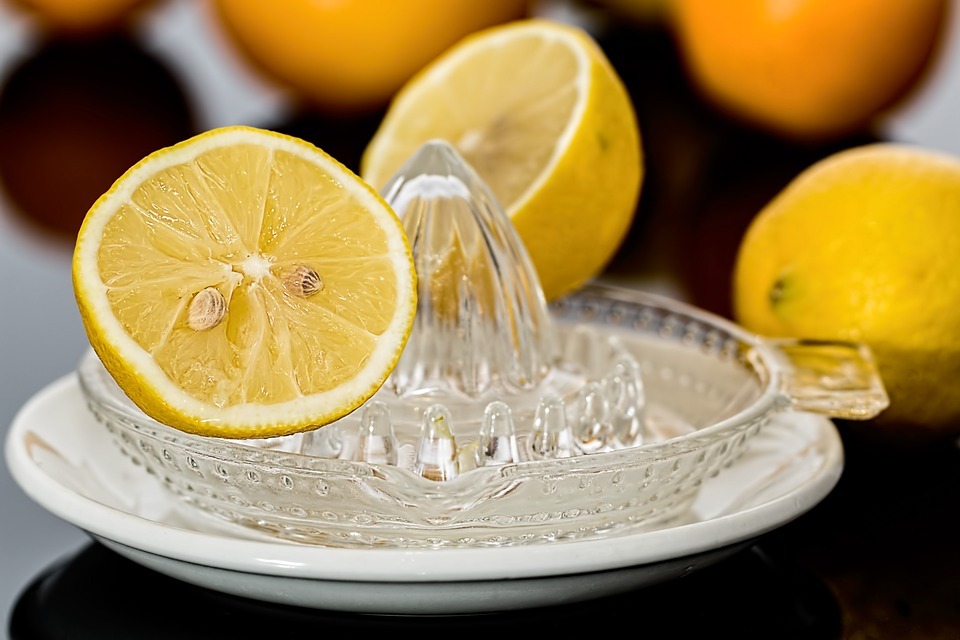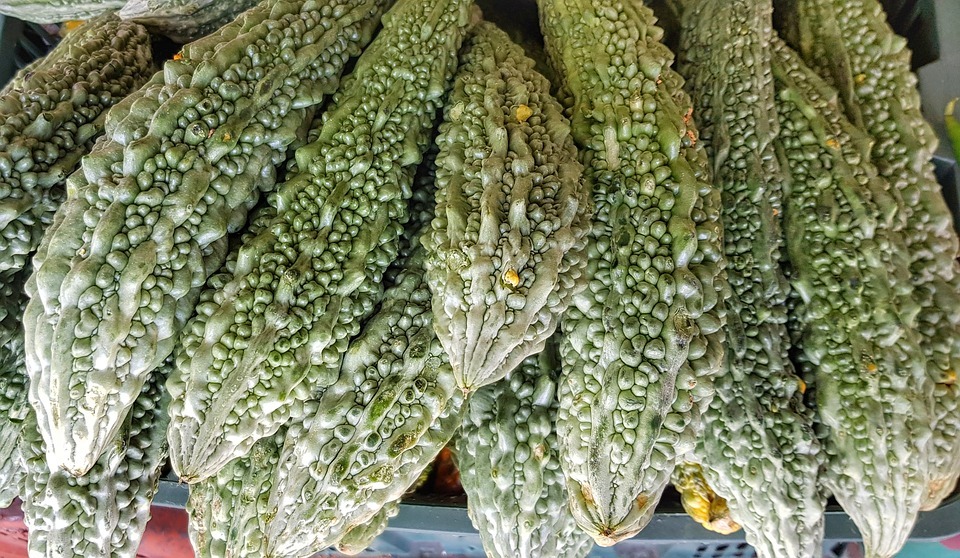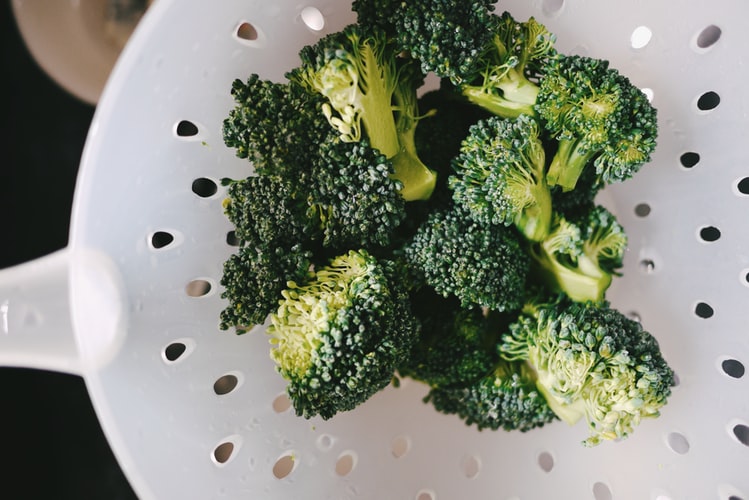Basil Juice: Anti-Inflammatory and Antibacterial Benefits in Every Sip
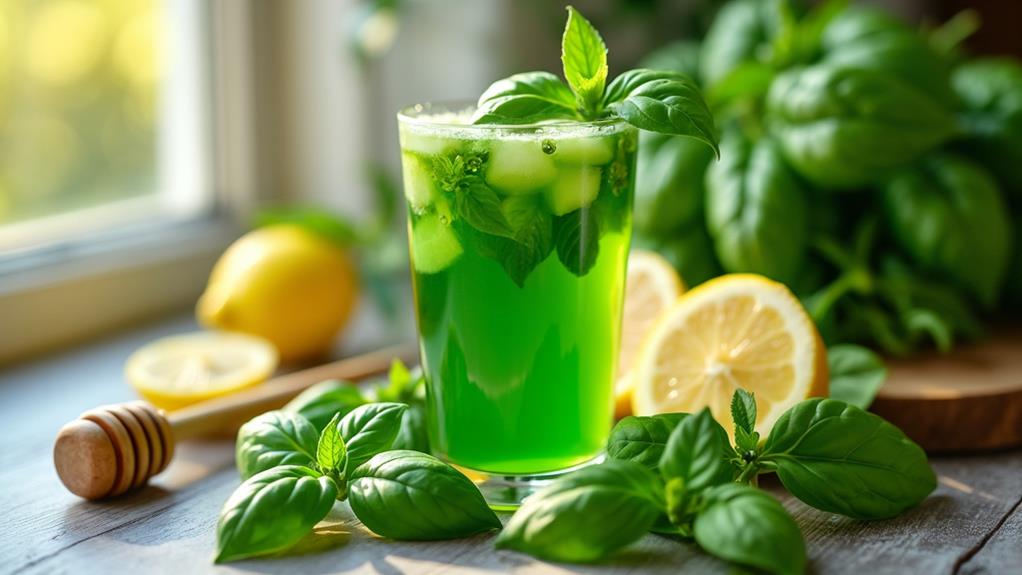
Basil juice is a revitalizing way to tap into its anti-inflammatory and antibacterial benefits. You'll find it packed with antioxidants like flavonoids and eugenol, which combat oxidative stress and reduce inflammation. The antibacterial properties fight off harmful pathogens, promoting oral and immune health. With just 1 calorie per two tablespoons, basil juice offers guilt-free consumption while providing vital vitamins and minerals. Incorporate it into your daily routine by adding it to smoothies or salad dressings. Enjoy its unique flavor and health perks safely by consulting a healthcare professional if necessary. There's a lot more to uncover about basil juice's potential.
Understanding Basil Juice
When you investigate the world of basil juice, you'll uncover its rich nutritional profile that makes it a powerhouse of health benefits. Derived from fresh basil leaves, this juice is packed with fundamental minerals like calcium and magnesium, contributing to its impressive nutritional credentials. But there's more to basil juice than just minerals. It's loaded with antioxidants, including flavonoids and polyphenols, which are pivotal in combating oxidative stress. These antioxidants play an important role in reducing inflammation, helping you maintain a balanced and healthy body.
Basil juice isn't just about internal health; it has notable antibacterial effects too. Regular consumption can promote oral health by fighting off numerous pathogens, potentially preventing infections. The presence of eugenol, a key compound in basil, improves its anti-inflammatory properties, offering relief from symptoms associated with inflammatory conditions. This makes basil juice an excellent supplement to health-conscious diets, supporting comprehensive wellness.
Nutritional Components
Basil juice boasts a remarkable nutritional profile that's hard to ignore. With only 1 calorie per 2 tablespoons, you can enjoy its impressive nutritional value without worrying about caloric intake. It's packed with fundamental vitamins like A, C, and K. Vitamin K is particularly abundant, playing an important role in blood clotting and maintaining bone health. The minerals in basil juice, including calcium and magnesium, are essential for supporting a range of body functions. Calcium is key for strong bones, while magnesium supports muscle and nerve function.
Basil's high antioxidant content, with flavonoids and polyphenols, makes it a powerful ally in combating oxidative stress. These antioxidants support your immune function by neutralizing harmful free radicals. One of basil's standout compounds, eugenol, provides both anti-inflammatory and antibacterial benefits. While eugenol's anti-inflammatory properties help reduce inflammation-related conditions, its antibacterial nature can aid in fighting off harmful bacteria.
Incorporating basil juice into your diet offers a wealth of health benefits thanks to its vitamins, minerals, and antioxidants. If you're looking to enhance your immune system or support bone health, basil juice is a nutrient-dense choice that brings significant nutritional value to your beverages.
Anti-Inflammatory Properties
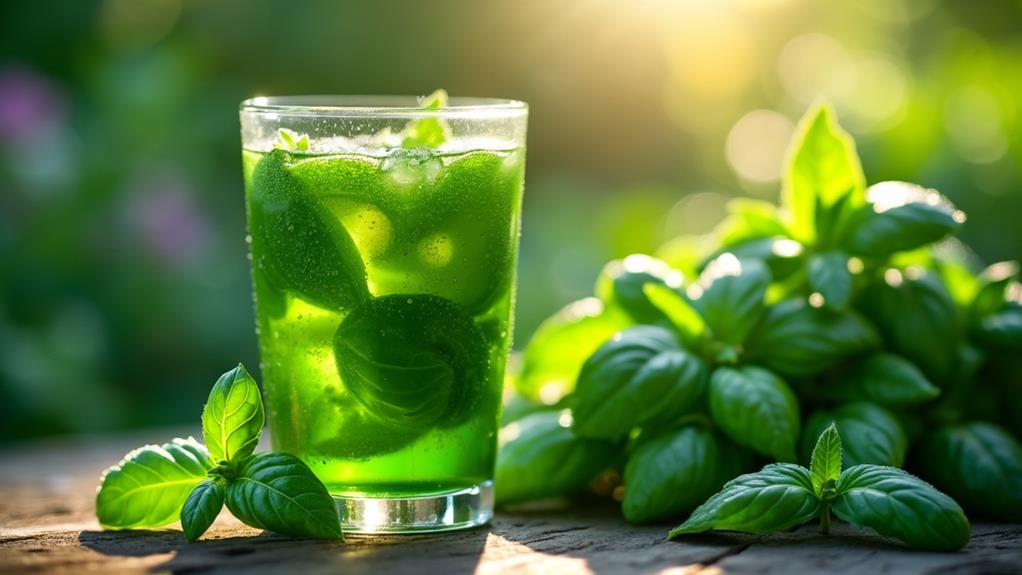
Beyond its impressive nutritional profile, basil juice offers significant anti-inflammatory benefits that can improve your well-being. Packed with eugenol, basil juice boasts powerful anti-inflammatory properties. This compound is especially beneficial if you're dealing with inflammatory diseases like arthritis. Eugenol works by inhibiting pro-inflammatory cytokines, which can help lower inflammation markers in your body. This means that regularly including basil juice in your diet may help you manage symptoms associated with these conditions.
Moreover, basil juice is rich in antioxidants, which play a vital role in combating oxidative stress. This is significant because oxidative stress can worsen inflammation, making it harder for your body to recover from injuries and physical stressors. By reducing oxidative stress, basil juice helps support your body's recovery process and maintains overall joint health. So, if you're looking to improve mobility and reduce inflammation, basil juice might be a great supplement to your routine.
Incorporating basil juice into your diet not only aids in reducing inflammation but also supports recovery from daily physical stressors. Regardless if you're an athlete or just someone dealing with everyday aches, these anti-inflammatory properties can make a real difference in your quality of life.
Antibacterial Benefits
You'll find that basil juice isn't just a flavorful improvement to your diet; it's also packed with strong antibacterial properties that can greatly benefit your health. The vital oils in basil, particularly eugenol, play a significant role in combating harmful pathogens like E. coli and Staphylococcus aureus. These oils work by disrupting the cell membranes of these bacteria, making basil juice a powerful tool for infection prevention and food preservation.
Incorporating basil juice into your routine can serve as a natural antimicrobial agent, effective against not only bacteria but also certain fungi and viruses. This makes it a diverse addition to your health regimen. Traditional medicine has long recognized these benefits, using basil extracts to treat wounds and prevent infections, underscoring its historical significance and effectiveness.
Moreover, basil juice's antibacterial properties contribute to boosting your immune defense, helping your body fight off different infections. By regularly consuming this potent juice, you're tapping into a natural remedy that has been valued for centuries. Regardless of your interest in its ability to preserve food, improve oral health, or prevent infections, basil juice offers a host of benefits rooted in its powerful antibacterial capabilities.
Immune Support
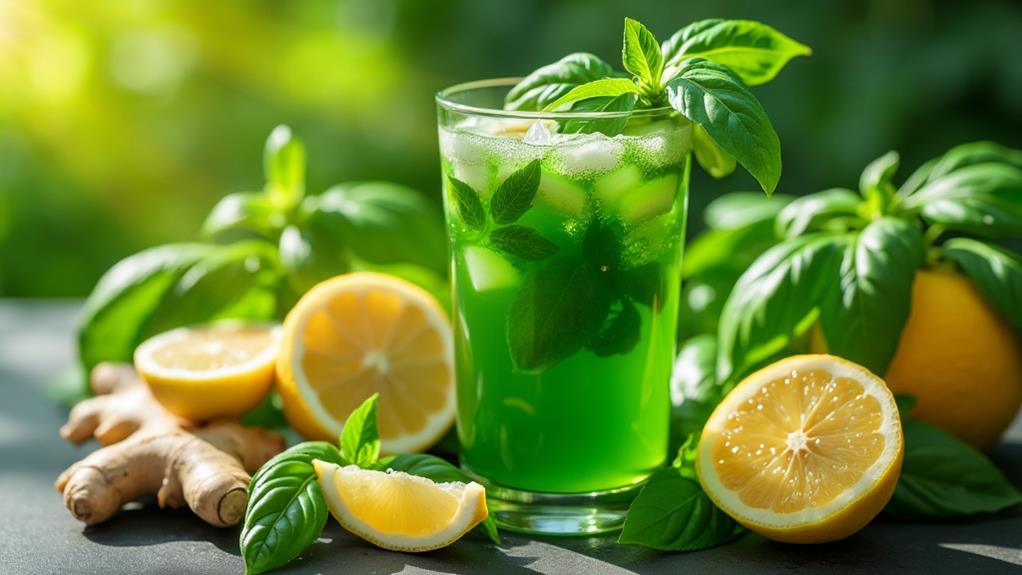
While basil juice's antibacterial properties are impressive, it also plays a significant role in supporting your immune system. Packed with antioxidants, basil juice helps combat oxidative stress, which can weaken your body's defenses. The eugenol in basil juice boasts potent anti-inflammatory properties, reducing inflammation and strengthening your immune function. This vital oil's ability to fight off harmful bacteria further improves your body's immune defense, making it a reliable ally against various pathogens.
Your digestive health is essential for a robust immune system, and basil juice supports this by promoting a healthy gut microbiome. A balanced gut environment is critical for effective immune response. Furthermore, the high vitamin K content in basil juice is necessary for proper blood clotting and contributes to maintaining a healthy immune system.
Regular consumption of basil juice can also help alleviate symptoms of respiratory infections. Thanks to its antimicrobial properties, it supports better immune health, helping you fend off colds and other respiratory issues. By incorporating basil juice into your routine, you're not only enhancing your immune support but also improving your complete well-being, making it a potent addition to your daily health regimen.
How to Make Basil Juice
To create a revitalizing basil juice, start by thoroughly washing 1-2 cups of fresh basil leaves to remove any dirt or impurities. This step guarantees you're getting a pure base for your juice, maximizing its health benefits. Once cleaned, blend the basil leaves with 1/2 to 1 cup of water until the mixture is smooth. This process aids in releasing the natural basil extract, which is packed with antioxidants and anti-inflammatory compounds that support your immune system.
Next, strain the blended mixture using a fine mesh sieve or cheesecloth to extract the basil juice, leaving behind any solid particles. This guarantees a smooth, invigorating beverage. For extra flavor and nutrients, you might add a splash of lemon juice or a teaspoon of honey. These ingredients improve the taste and contribute their own health benefits.
Once prepared, basil juice can be consumed immediately for the best flavor and maximum nutrient retention. If you've made a larger batch, you can store it in the refrigerator for up to 2-3 days, though fresher is always better. Enjoy this aromatic, health-boosting drink as a delicious way to bolster your wellness routine.
Incorporating Into Daily Diet
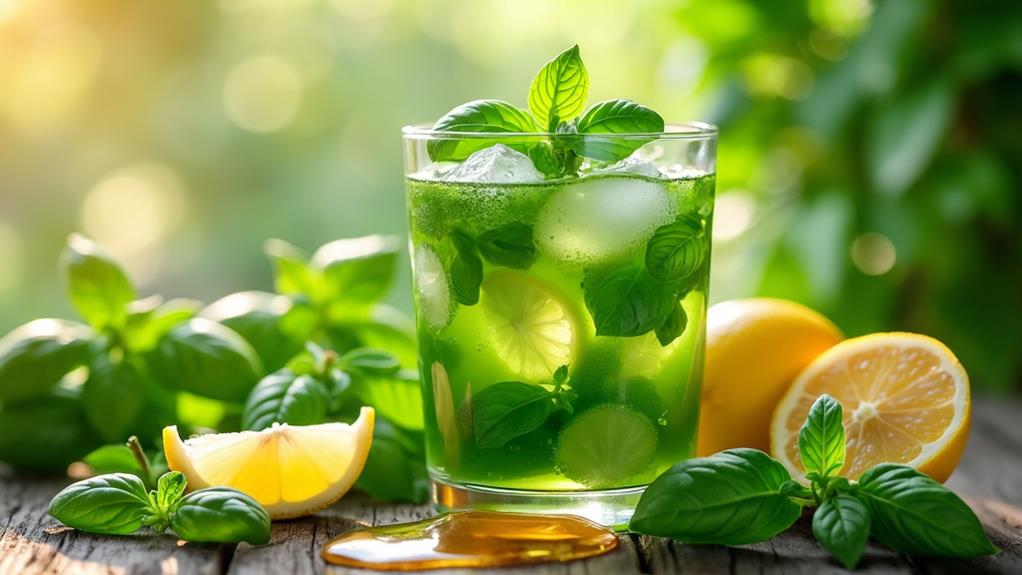
Incorporating basil juice into your daily diet is a simple yet effective way to improve your general well-being. With its rich supply of vitamins A, K, and C, basil juice provides vital nutrients without adding many calories. Regular consumption can strengthen your immune defense, thanks to its antibacterial properties that help fend off infections. Including this juice in your routine can be particularly beneficial for maintaining robust health.
Basil juice isn't just about vitamins; its antioxidants play a significant role in combating oxidative stress. This powerful effect may lower the risk of chronic diseases like heart disease and cancer. Additionally, its anti-inflammatory properties, derived mainly from eugenol, can help alleviate symptoms of inflammatory conditions and support joint health.
For those seeking to improve their digestive health, basil juice can be a game-changer. Its fiber content and the effects of eugenol can relieve bloating and promote ideal digestion. By incorporating basil juice into your daily diet, you're not only enriching your nutrient intake but also supporting your digestive system's well-being. Enjoy the health benefits of this versatile juice by making it a regular part of your routine.
Potential Side Effects
Could you experience any downsides from drinking basil juice? While it's generally safe in moderate amounts, overconsumption can cause gastrointestinal issues like nausea or diarrhea. These reactions arise from the potent compounds found in basil juice. Furthermore, if you're taking anticoagulant medications, such as warfarin, you should be cautious. Basil juice is high in vitamin K, which can interfere with these medications and potentially increase the risk of blood clotting complications.
If you have bleeding disorders or are scheduled for surgery, consuming high doses of basil juice might not be advisable due to its blood-thinning effects. It's essential to avoid any potential health risks that could arise in these situations. In addition, if you're managing blood pressure or diabetes with medication, basil juice might lower these levels, so it's wise to consult with healthcare providers before making it a regular part of your diet.
Comparing Basil Varieties
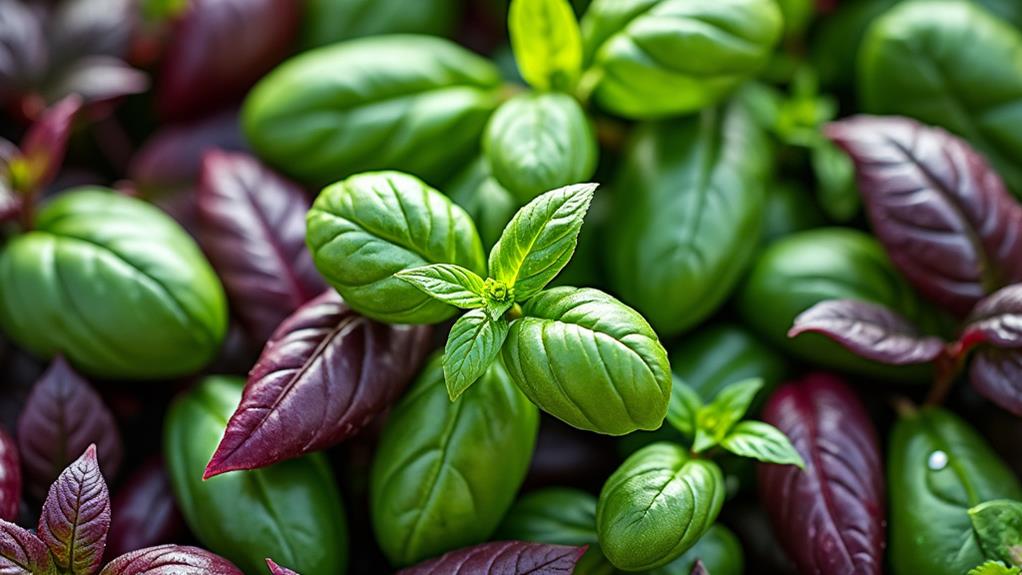
Regarding basil, you'll find a selection of options, each offering unique flavors and uses. Sweet basil, the most popular of the basil varieties, is cherished for its licorice-clove flavor, making it a staple in Italian cuisine, particularly in pesto. Its antibacterial and anti-inflammatory properties add to its health benefits. On the other hand, Thai basil boasts a distinct anise-licorice flavor, perfect for Southeast Asian dishes. This variety retains its aroma even when cooked, making it invaluable in numerous culinary uses.
Holy basil tulsi, revered in Hindu culture, stands out with its adaptogenic properties. It provides stress relief and immune support, along with antibacterial benefits. Its unique flavor profile makes it appealing for both culinary and medicinal purposes. Beyond these, there are additional basil varieties worth exploring:
- Purple Basil: Offers a striking, spicy flavor and visual appeal.
- Bush Basil: Known for its strong aroma and mild flavor, ideal for container gardening.
- Greek Basil: Shares similarities with bush basil, but it's more compact.
- Lemon Basil: Provides a fresh citrus note, great for salads and teas.
Each basil type contributes distinct flavors and health benefits, enhancing your culinary adventures.
Expert Tips and Recommendations
When you decide to incorporate basil juice into your diet, a few expert tips can improve your experience and optimize health benefits. Begin by using fresh basil to make your juice. This guarantees you get the full range of vitamins A, K, and C, which are vital for skin health and enhancing your immune function. Fresh basil also contains eugenol, a potent anti-inflammatory compound that can help relieve arthritis symptoms and other inflammatory conditions.
To truly leverage the antibacterial properties of basil juice, consume it fresh and unprocessed. Heating can reduce its nutritional value and diminish the potency of its bioactive compounds. Regular consumption can help combat harmful pathogens, promoting general health and strengthening your immune system.
However, if you're on blood-thinning medications or have specific health conditions, it's important to consult your healthcare provider before adding basil juice to your routine. Basil juice might influence blood coagulation, and professional guidance guarantees your safety. By following these expert recommendations, you can enjoy the full benefits of basil juice, enhancing your health naturally and effectively. Remember, moderation and proper guidance are key to revealing its potential.

